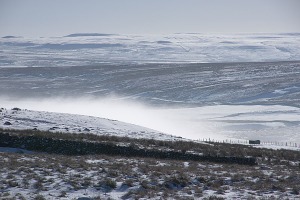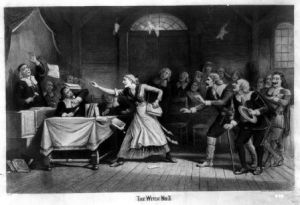This picture is the cover of a pamphlet published in 1791 by the satirist, Peter Pindar (John Wolcot), a copy of which is in the British Museum’s collection. It is the last of several written attacking Sir James Lowther, 1st Earl of Lonsdale (1736-1802) known throughout the nation as ‘Wicked Jimmy’. He owned much of the coastal town of Whitehaven, and the Continue reading
History: 18th century
The Danger of Charms: 18thc Hawkshead spells
If you cut your hand in 21st century Britain, you’d be fairly surprised if someone seized it and started chanting verse about Judea, Jesus, the Holy Ghost and Bethlehem. You’d think a) that’s no substitute for Savlon and a packet of plasters and b) how extraordinarily devout. And yet for much of the 16th and 17th centuries, what sounds like a prayer to modern ears would have been seen as evidence of a pact with diabolic forces. Just a few miles north over the border in Scotland, it could have had you burnt at the stake1.
In the third quarter of the 19th century, this charm2 was found Continue reading
The Hanged Man at Beacon Hill
Beacon Hill in Penrith is one of those places you might like to avoid at Halloween. For, says local tradition, your nose may catch the noisome odour of rotting flesh before coming upon the gruesome sight of a man’s body rotting in a gibbet hanging high above the town.
One dark Tuesday night in November, 1766, a butcher called Thomas Parker was on his way home after a very good day at Penrith market. He stopped off at the Cross Keys pub in Carleton, where he had a jolly old time downing lots of beer and treating all his friends. Eventually, the pub landlord realised that Parker had had far too much and stopped serving him, offering to put him up for the night to sleep it off. Parker refused, and set off to walk the last couple of miles back to Langwathby. Continue reading
Faeries, spectral lights and October beer… Lamplugh’s 17thc troubles

Lamplugh register
According to a document from the village of Lamplugh, in west Cumbria, mid 17th– century parishioners were battling a plague of faeries, witches, will ‘o the wisps, man-eating dogs, fatally strong beer and spontaneous brawling. The document describes itself as a register of deaths for the period 1656 to 1663, and includes the following causes of death:
Two duels, fought with a frying pan and pitchforks – 1
Crost in love – 11
Mrs Lamplugh’s cordial water – 2
Frighted to death by faries – 42
Of strong October at the hall – 143
Bewitched – 7
Old women drowned upon the trial for witchcraft – 34
Led into a horse pond by a will of the whisp – 15
Vagrant beggars worried by Esquire Lamplugh’s housedog – 2 Continue reading
The Stainmore Hand of Glory
The Spital Inn at Stainmore was in an interesting location. A completely wild part of the country even now, it was for centuries the main route into the Eden Valley and northern Cumbria. During the eighteenth century, the Spital Inn was a crucial part of the long-distance coaching route, and was the place where the national mail coach changed horses before heading down the hill in either direction.
changed horses before heading down the hill in either direction.
At some point at the end of the eighteenth century – possibly 1797 – the innkeeper, George Alderson, was preparing to settle for the night when an old lady appeared at the door and asked if she could sleep by the fire. Alderson was not a man to turn the needy away, so he assented but asked his maid Bella to sleep downstairs, too. Continue reading
Famous Cumbrians: William Wordsworth (1770-1850)
A leading figure in the Romantic movement, Wordsworth wrote poetry inspired by strong emotion, but ‘remembered in tranquillity’. Born in Cockermouth and educated in Penrith and Hawkshead, Wordsworth lived in France as a young man immediately before the French Revolution, developing radical ideas and a mistress and child. Wordsworth returned to the Lake District in 1799 to live in Dove Cottage (open to the public) in Grasmere, and I believe received wisdom amongst poetry-philes is that he became increasingly conservative, which probably explains how this one-time radical could become Poet Laureate. Continue reading
in Penrith and Hawkshead, Wordsworth lived in France as a young man immediately before the French Revolution, developing radical ideas and a mistress and child. Wordsworth returned to the Lake District in 1799 to live in Dove Cottage (open to the public) in Grasmere, and I believe received wisdom amongst poetry-philes is that he became increasingly conservative, which probably explains how this one-time radical could become Poet Laureate. Continue reading
Famous Cumbrians: Fletcher Christian (1764-1793)
It’s probably safe to say you’re famous if Errol Flynn, Clark Gable, Marlon Brando and Mel Gibson have all played you in blockbuster films. Fletcher Christian was born in Brigham, near Cockermouth, where he went to school with the poet, William Wordsworth. Christian had travelled to India and twice with Captain Bligh to Jamaica before they set off on the ill-fated trip to Tahiti in April, 1789. Later that year, 1300 miles west of Tahiti, Christian led the mutiny on the Bounty. Continue reading
Brigham, near Cockermouth, where he went to school with the poet, William Wordsworth. Christian had travelled to India and twice with Captain Bligh to Jamaica before they set off on the ill-fated trip to Tahiti in April, 1789. Later that year, 1300 miles west of Tahiti, Christian led the mutiny on the Bounty. Continue reading



